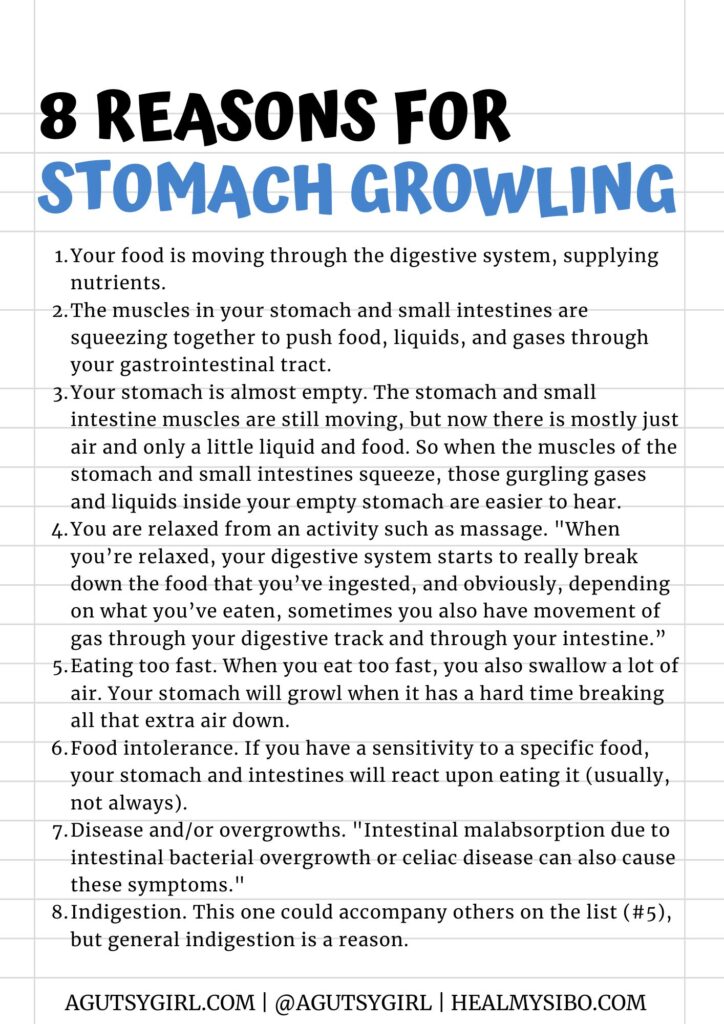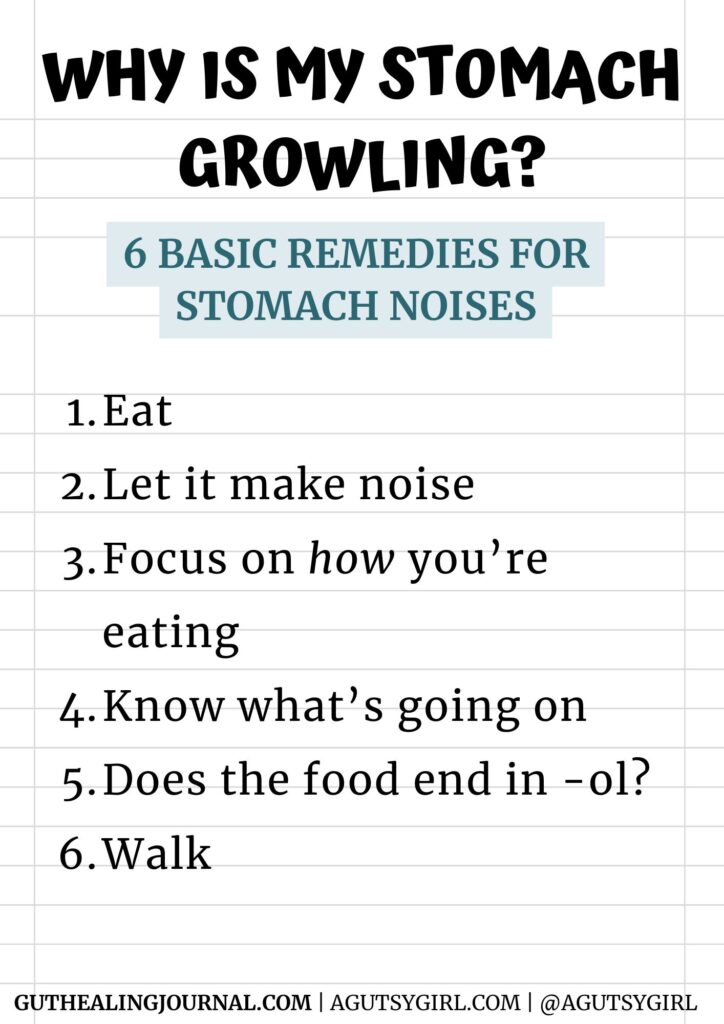Ever wondered, “Why is my stomach growling?” Let’s explore.
I recently heard that the stomach doesn’t growl solely because it’s hungry. I’m not sure about you, but this is what I always thought.
Well, mostly anyways.
When my SIBO was at its worst, I can distinctively remember pushing on the (right more than left) lower side of my stomach and hearing it “slosh.”
Yes, I heard a weird noise and called it sloshing.
Maybe you know what I’m talking about?
It was a form of rumbling and growling, but rarely did I feel hungry when it happened.
Thus, I knew the noises the stomach makes are about much more than just hunger.
So I started exploring.
Why is My Stomach Growling
Click HERE to save this post for later.

If you want to sound super intelligent the next time your stomach starts rumbling say,
This borborygmi is really loud today.
Borborygmi is the technical name for the sound gas makes as it works its way through the intestines.
However, you likely refer to borborygmi as stomach growling, rumbling, sloshing, churning, etc.
According to the International Foundation for Gastrointestinal Disorders,
In order for the bowel (intestines) to be heard, three conditions must be met:
- Muscular contraction of the intestinal wall
- The presence within the intestines of liquid
- The presence within the intestines of gas
But what are some of the reasons for those three things?
Why Does My Stomach Growl When I’m Not Hungry?
How many times have you thought,
Why does my stomach growl when I’m not hungry?
You are correct. There are many potential reasons for it.
In fact, there are 8 reasons for stomach growling that I have laid out below. And of these 8 reasons, only 1 fits into the narrative that you are, in fact, hungry.
From your food moving through digestive system to disease and/or overgrowths, you’re going to understand more about your stomach growling without feeling physically hungry.
8 Reasons for Stomach Growling
Click HERE to save these 8 reasons for later.

- Your food is moving through the digestive system, supplying nutrients.
- The muscles in your stomach and small intestines are squeezing together to push food, liquids, and gases through your gastrointestinal tract.
- Your stomach is almost empty. The stomach and small intestine muscles are still moving, but now there is mostly just air and only a little liquid and food. So when the muscles of the stomach and small intestines squeeze, those gurgling gases and liquids inside your empty stomach are easier to hear.
- You are relaxed from an activity such as massage. “When you’re relaxed, your digestive system starts to really break down the food that you’ve ingested, and obviously, depending on what you’ve eaten, sometimes you also have movement of gas through your digestive track and through your intestine.”
- Eating too fast. When you eat too fast, you also swallow a lot of air. Your stomach will growl when it has a hard time breaking all that extra air down.
- Food intolerance. If you have a sensitivity to a specific food, your stomach and intestines will react upon eating it (usually, not always).
- Disease and/or overgrowths. “Intestinal malabsorption due to intestinal bacterial overgrowth or celiac disease can also cause these symptoms.”
- Indigestion. This one could accompany others on the list (#5), but general indigestion is a reason.
Sources: HERE
6 Basic Remedies for Stomach Noises

So now you know what stomach growling causes are.
Then, what is the remedy?
Here are 6 basic remedies for stomach noises:
1. Eat
Ding, ding, ding.
Hello, Captain Obvious, but yes, perhaps you just need to eat?
If your stomach is growling and you feel hungry, maybe it’s as simple as eating.
2. Let it make noise
If you are certain you’re not hungry and nothing is wrong, then just let it make noises.
If the stomach noises are not extreme and excessive over a period of time, then just let them make noise. (i.e. You just had that massage and are super relaxed.)
3. How you’re eating
Remember when I shared with you a ton of information on how to eat?
Pay attention to all those things surrounding how you’re eating for maximum digestion; minimum noises.
4. Know what’s going on
If you’re keeping that meticulous food journal, you’ll be better off knowing which foods are triggering reactions.
These reactions could be the stomach noises, but they could also include stomach noises at the same time as bloat, gas, etc.
5. Ends in -ol
Eating a lot of foods that end in -ol?
That could be the culprit.
For more on this, check out:
6. Walk
If your stomach is growling due to indigestion, consider going for an easy walk or doing simple movements.
The goal is to keep your digestive system moving in a smooth fashion.
Peristalsis
While there are many reasons your stomach is rumbling, they all come back to peristalsis.
Remember from Your Digestive System,
In a healthy gut, food moves through the GI tract through a process called peristalsis, which is a wave-like movement that helps push food forward.
The reason you, as a Gutsy girl are searching, “Why is my stomach rumbling” likely boils down to peristalsis and the MMC (Migrating Motor Complex).
Why do we also hear them when there is no food in our stomachs?
That is down to something called the Migrating Motor Complex, (MMC), a specific type of electrical pulse that triggers peristalsis in the digestive system.
This is thought to serve a house-keeping function, clearing out any leftover food particles, mucus, bacteria or other debris from the stomach and small intestine. source
If any part of that is off in your digestive system, you might be hearing loud noises more often than not.
On the flip side, not all noises are negative.
Many of them are simply part of the normal digestive process.
The way to know whether your rumbling stomach is “normal” or not is to consider other symptoms and, of course, via official diagnostic tools and testing.
If you liked this post, you might also enjoy:
Xox,
SKH
🤰 bloating be gone! weight loss through optimal gut health for women
💃ʜᴇᴀʟ ʏᴏᴜʀ ɢᴜᴛ. ʜᴇᴀʟ ʏᴏᴜʀ ʟɪfe.
🫶🏻 founder gutbyome.com




![Types of Magnesium [Your Master Guide]](https://agutsygirl.com/wp-content/uploads/2020/11/magnesium-featured-agutsygirl.com_.png)

![Redness around Nose [Brazen]](https://agutsygirl.com/wp-content/uploads/2013/09/skin-health-featured-agutsygirl.com_.png)
